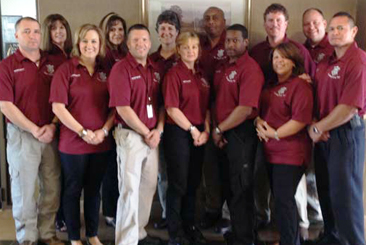|
|
| Crisis Negotiation Team |
| By Katherine O'Neill, DOC Director of Behavioral Health |
| Published: 11/05/2012 |
 The use of negotiations in a crisis situation is as old as civilization itself. The freedom
of soldiers captured in battle was frequently negotiated in many cultures. The use of
negotiations as a practice in law enforcement dates to the tragic loss of life in the terrorist
attacks on Israeli athletes during the 1972 Munich Olympics. The brutality of
this incident led to international assessments of the failed tactics used during this
crisis. Later that same year, Detective Harvey Schlossberg, Ph.D. and Lieutenant
Frank Boltz of the New York City Police Department (NYPD) researched and developed
the use of hostage negotiations in the United States; at the invitation of the
NYPD, the Federal Bureau of Investigation (FBI) joined this effort, creating a national,
40-hour training program for law enforcement. All members of the DOC Crisis
Negotiation Team (CNT) are required to attend this specialized training.
The use of negotiations in a crisis situation is as old as civilization itself. The freedom
of soldiers captured in battle was frequently negotiated in many cultures. The use of
negotiations as a practice in law enforcement dates to the tragic loss of life in the terrorist
attacks on Israeli athletes during the 1972 Munich Olympics. The brutality of
this incident led to international assessments of the failed tactics used during this
crisis. Later that same year, Detective Harvey Schlossberg, Ph.D. and Lieutenant
Frank Boltz of the New York City Police Department (NYPD) researched and developed
the use of hostage negotiations in the United States; at the invitation of the
NYPD, the Federal Bureau of Investigation (FBI) joined this effort, creating a national,
40-hour training program for law enforcement. All members of the DOC Crisis
Negotiation Team (CNT) are required to attend this specialized training.
The Department of Correction first formed a negotiation team in 1978; this coincided with the formation of the tactical teams, in response to the increasing number of institutional disorders. Prior to this time, the DOC relied heavily on the Massachusetts State Police. The original DOC team members trained with Detectives Schlossberg and Boltz and as this discipline matured, developed a strong relationship with the FBI. This association continues, as it does with several other law enforcement agencies through shared conferences, drills and trainings. Just as a tactical officer is part of a team, so is a negotiator. The Department has adopted this team approach to negotiations. The CNT presently includes 16 members from across various institutions and disciplines. Members are traditionally selected from Tier 1 and Tier 2 responders. Positions within the CNT are comprised of: the CNT Coordinator, a Mental Health Consultant, the CNT Team Leader, Primary Negotiator, Coach, Technician, Intelligence, Tactical Liaison, and Recorder. As a team, CNT members meet monthly to participate in experiential training by testing and operating specialized equipment, facilitating reality-based crisis/hostage type scenarios and reviewing the most current literature and research applicable to the field of negotiations. All CNT members are affiliated with the New England Crisis Negotiators Association (NECNA) and through this membership directly participate in numerous multi-agency trainings, drills and conferences. Another key function of the CNT team is to provide training for institutional first responders. These trained staff members respond to crisis incidents within their facilities such as barricaded subjects, hostage situations, forced moves and other crisis situations. Utilizing the de-escalation techniques learned through training have proven to be a useful tool in lowering the overall number of uses of force and aiding in the prevention of injury to staff and inmates. Beginning in 2010, in collaboration with institutional Superintendents, the CNT team began assisting facility staff in scheduled and un-scheduled disorder management training scenarios. This hands-on training enables the institutional staff to better identify their strengths and weaknesses in responding to an actual disorder. Thus far, these types of realistic training scenarios have been conducted at MCI Shirley, Old Colony Correctional Center, Massachusetts Treatment Center and MCI Norfolk. After participating in a drill at MCI Norfolk, Deputy Commissioner Peter Pepe responded with CNT members to an actual crisis four days later at Bridgewater State Hospital. When asked for his thoughts regarding his experience with CNT he said, “It is important that we conduct these integrated drills between CNT and facilities. It is equally as important that these drills are as realistic as possible so that the experience of the drill puts us in a better position to respond to an actual event. In the coming months I would like to see a drill at a facility that includes DOC Command staff, facility command staff, CNT, and Special Ops.” Reprinted with permission from "Around the Block" September 2012 - MA DOC news letter |
Comments:
Login to let us know what you think
MARKETPLACE search vendors | advanced search

IN CASE YOU MISSED IT
|


Hamilton loves books about unicorns, storms, and cubicles. He lives in Waco with his cat named Mr. Bojangles. Before his work as an attorney, Hamilton was a leprechaun chaser. His all-time record is three pots of gold at the end of the rainbow. He was forced to give up the gold in a dispute with a rival hobbit. He spends his free time tripping out on the smallest details, none of which are important He likes doing the things with the ball and scoring the points. He pays attention to the green of your eyes, even when it is not Saint Patrick’s Day. He is not Irish. Hamilton Lindley has fun plans for people in need. Whether your need a dreamcatcher for your dreams or a tape dispenser to put your life back together, he can be there for you to yell at. There are times when it is surprising that he has any friends at all. But thankfully he does have a few. He drives a Dodge Stratus. People respect him, except at home.